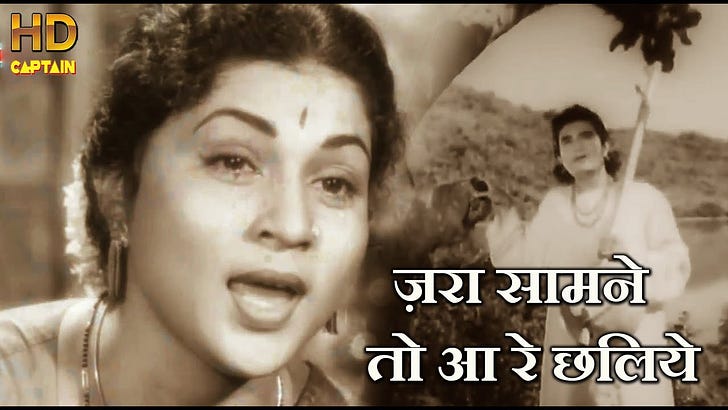Chhaayaageet #102 - "Apna saara dard gaanon mein bhar dijiye."
Pour all your sorrow into your songs.
The lyricist is at the peak of his career. One day, an argument with his son blows up into something none of them imagine. In anger, the son walks out of the house. The lyricist's wife is distraught.
"Jab bhook lagegi, to apne aap ghar aayenge sahabzade", the lyricist tells his wife. When he gets hungry, he will automatically come home.
Except, he does not. A day, then a few days, then a week, and then few weeks pass. No sign of the son returning home.
Stages of grief ensue, first denial, then anger. How can he just leave? Does anyone leave home just like that? Can a father not say anything to his son?
He checks with friends and relatives, then the police and hospitals. No luck. The bargaining stage of grief sets in. He visits temples, mosques, any place where can plead his case to God. Please God, please, find him and send him back to us. I will do anything to have him back again.
In the midst of all this, the pen has dried up. Words don't flow on paper, only tears. One day a filmmaker comes to his house. A song is needed for a film. Would he write?
The lyricist is besides himself. Too soon. The wound is still fresh. "Aap chale jaiye. Chale jaiye yahan se. Mein kuch nahin likhunga", the lyricist practically drives the filmmaker out of his house. Please leave. Please leave right away. I am not going to write anything.
Just then the wife comes home from outside and sees the filmmaker being ushered out the door. She calms the lyricist down, and pleads the filmmaker, "Inki baat ka bura mat maniye. Aap kripa karke kal aaiye. Mein inse baat karti hoon". Please don't mind my husband. Please come back tomorrow. I will talk to him.
The filmmaker nods in agreement and leaves. The wife takes a deep breath. "Aapko likhna chahiye. Apna saara dard gaanon mein bhar dijiye", she counsels the lyricist. You start writing again. Pour all your sadness into your songs.
Genuine poetry flows when the heart bleeds. He writes the antara:
Hum tumhen chahein tum nahin chaho
Aisa kabhi na ho sakta
Pita apne baalak se bichhad ke
Sukh se kabhi na so sakta
The song becomes a super hit, rising to the top of the charts.
Pandit Bharat Vyas wrote the song Jara samne to aao chhaliye for Janam Janam Ke Phere (1957), directed by Manmohan Desai, music by SN Tripathi. Lata Mangeshkar and Mohammad Rafi rendered with a lot of soulful emotion. It was filmed on Nirupa Roy and Manher Desai.
This song became extremely popular and rose to the top spot in Binaca Geetmala amidst many other very popular songs of that year. However, Bharat Vyas' profound sadness on the disappearance of his son did not abate.
In the 1959 film, Rani Rupmati, Bharat Vyas again channeled the same emotions into another hit song, Aa laut ke aaja mere meet, sung by Mukesh, and filmed on Bharat Bhushan and Nirupa Roy. SN Tripathi directed the film and also composed music.
SN Tripathi was one of the earliest artists who acted, directed and also composed music for films, much before Kishore Kumar.
When this song also became extremely popular, it must have reached the estranged son's ears, for he returned home. How could he not? Notice the lyrics:
Aa laut ke aaja mere meet
Tujhe mere geet bulate hain
Mera soona pada re sangeet
Tujhe mere geet bulate hain
Aa laut ke aaja mere meet
Barse gagan mere barse nayan
Dekho tarse hai man ab to aaja
Sheetal pavan yeh lagaye agan
O sajan ab to mukhda dikha ja
Toone bhali re nibhai preet
Tujhe mere geet bulate hain
Aa laut ke aaja mere meet
Genuine poetry flows when the heart bleeds.
Jara samne to aao chhaliye
Lyrics: Bharat Vyas
Music: SN Tripathi
Singers: Lata Mangeshkar, Mohammad Rafi
*ing: Nirupa Roy, Manher Desai
Director: Manmohan Desai
Film: Janam Janam Ke Phere (1957)
Aa laut ke aaja mere meet
Lyrics: Bharat Vyas
Music: SN Tripathi
Singer: Mukesh
*ing: Bharat Bhushan, Nirupa Roy
Director: SN Tripathi
Film: Rani Rupmati (1959)
Story credit: Pravin D, USA


